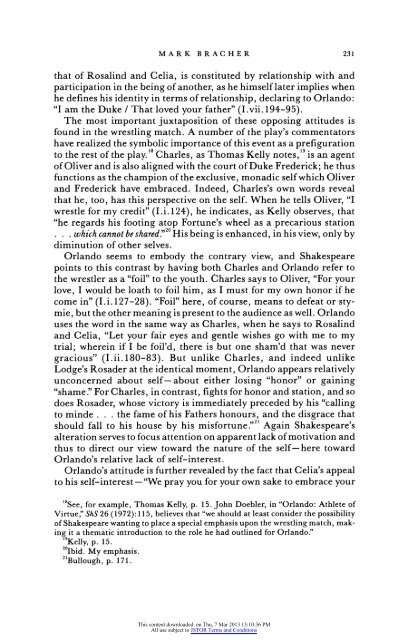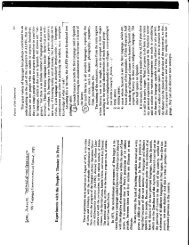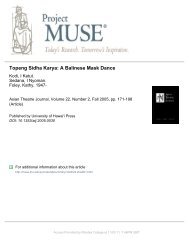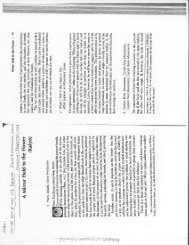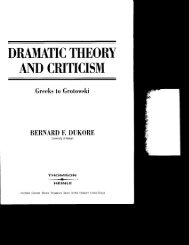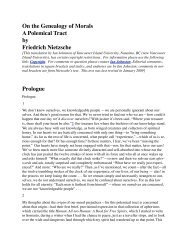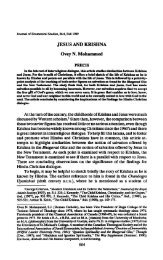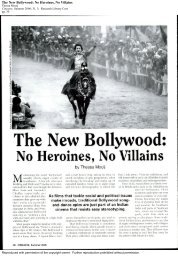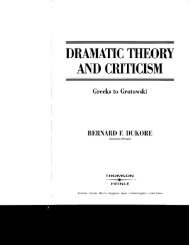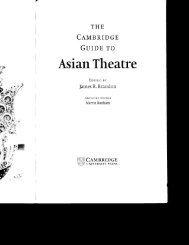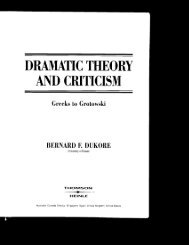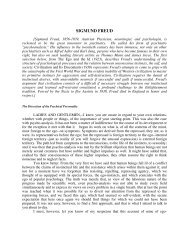Contrary Notions of Identity in As You like It - Yavanika
Contrary Notions of Identity in As You like It - Yavanika
Contrary Notions of Identity in As You like It - Yavanika
You also want an ePaper? Increase the reach of your titles
YUMPU automatically turns print PDFs into web optimized ePapers that Google loves.
MARK BRAC HER<br />
231<br />
that <strong>of</strong> Rosal<strong>in</strong>d and Celia, is constituted by relationship with and<br />
participation <strong>in</strong> the be<strong>in</strong>g <strong>of</strong> another, as he himself later implies when<br />
he def<strong>in</strong>es his identity <strong>in</strong> terms <strong>of</strong> relationship, declar<strong>in</strong>g to Orlando:<br />
"I am the Duke / That loved your father" (I.vii. 194-95).<br />
The most important juxtaposition <strong>of</strong> these oppos<strong>in</strong>g attitudes is<br />
found <strong>in</strong> the wrestl<strong>in</strong>g match. A number <strong>of</strong> the play's commentators<br />
have realized the symbolic importance <strong>of</strong> this event as a prefiguration<br />
to the rest <strong>of</strong> the play.'8 Charles, as Thomas Kelly notes,' is an agent<br />
<strong>of</strong> Oliver and is also aligned with the court <strong>of</strong> Duke Frederick; he thus<br />
functions as the champion <strong>of</strong> the exclusive, monadic self which Oliver<br />
and Frederick have embraced. Indeed, Charles's own words reveal<br />
that he, too, has this perspective on the self. When he tells Oliver, "I<br />
wrestle for my credit" (I.i. 124), he <strong>in</strong>dicates, as Kelly observes, that<br />
"he regards his foot<strong>in</strong>g atop Fortune's wheel as a precarious station<br />
. which cannot be shared."20 His be<strong>in</strong>g is enhanced, <strong>in</strong> his view, only by<br />
dim<strong>in</strong>ution <strong>of</strong> other selves.<br />
Orlando seems to embody the contrary view, and Shakespeare<br />
po<strong>in</strong>ts to this contrast by hav<strong>in</strong>g both Charles and Orlando refer to<br />
the wrestler as a "foil" to the youth. Charles says to Oliver, "For your<br />
love, I would be loath to foil him, as I must for my own honor if he<br />
come <strong>in</strong>" (I.i. 127-28). "Foil" here, <strong>of</strong> course, means to defeat or stymie,<br />
but the other mean<strong>in</strong>g is present to the audience as well. Orlando<br />
uses the word <strong>in</strong> the same way as Charles, when he says to Rosal<strong>in</strong>d<br />
and Celia, "Let your fair eyes and gentle wishes go with me to my<br />
trial; where<strong>in</strong> if I be foil'd, there is but one sham'd that was never<br />
gracious" (I.ii.180-83). But un<strong>like</strong> Charles, and <strong>in</strong>deed un<strong>like</strong><br />
Lodge's Rosader at the identical moment, Orlando appears relatively<br />
unconcerned about self-about either los<strong>in</strong>g "honor" or ga<strong>in</strong><strong>in</strong>g<br />
"shame." For Charles, <strong>in</strong> contrast, fights for honor and station, and so<br />
does Rosader, whose victory is immediately preceded by his "call<strong>in</strong>g<br />
to m<strong>in</strong>de . . . the fame <strong>of</strong> his Fathers honours, and the disgrace that<br />
should fall to his house by his misfortune."2' Aga<strong>in</strong> Shakespeare's<br />
alteration serves to focus attention on apparent lack <strong>of</strong> motivation and<br />
thus to direct our view toward the nature <strong>of</strong> the self-here toward<br />
Orlando's relative lack <strong>of</strong> self-<strong>in</strong>terest.<br />
Orlando's attitude is further revealed by the fact that Celia's appeal<br />
to his self-<strong>in</strong>terest- "We pray you for your own sake to embrace your<br />
"See, for example, Thomas Kelly, p. 15. John Doebler, <strong>in</strong> "Orlando: Athlete <strong>of</strong><br />
Virtue," ShS 26 (1972): 115, believes that "we should at least consider the possibility<br />
<strong>of</strong> Shakespeare want<strong>in</strong>g to place a special emphasis upon the wrestl<strong>in</strong>g match, mak<strong>in</strong>g<br />
it a thematic <strong>in</strong>troduction to the role he had outl<strong>in</strong>ed for Orlando."<br />
9Kelly, p. 15.<br />
20Ibid. My emphasis.<br />
'Bullough, p. 171.<br />
This content downloaded on Thu, 7 Mar 2013 13:10:36 PM<br />
All use subject to JSTOR Terms and Conditions


